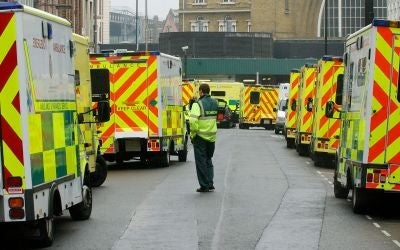Health Minister Norman Lamb pledges action on rural ambulance response times after death of young chef Peter Nelson
Norfolk chef’s death from brain haemorrhage may be linked to long wait for transport to hospital

Ambulance response times in rural areas should be urgently examined following the death of a young chef who died from a brain haemorrhage when paramedics took two hours to reach his home, a health minister has said.
North Norfolk MP Norman Lamb, minister of state for care and support, said he would urgently raise the issue with NHS England medical director Sir Bruce Keogh after Peter Nelson, 26, became the latest person to die following an ambulance delay in the east of England. Mr Lamb said the case was “all too familiar”, adding that rural areas were often neglected as ambulance trusts focused on easier urban response times as they chased national targets.
The Liberal Democrat added: “We need to re-think these targets because they distort behaviour. I don’t have a complete blueprint for the answer but I’m clear there is a massive risk that the current system is distorting clinical priorities and rural patients are suffering as a result.”
Mr Nelson collapsed at his home in Blakeney, Norfolk, after returning from work with a headache. His condition deteriorated, culminating in him coughing up blood and collapsing in the bathroom. His father Sidney Nelson, 59, and stepmother Haylie Wardhaugh, 45, dialled 999 at 11.15pm on 14 November but an ambulance did not arrive until after 1am the next day – taking more than six times longer than targets dictate. By the time Mr Nelson arrived at the Norfolk and Norwich University Hospital, nothing could be done to save him.
Sidney Nelson, who is disabled, said he was disgusted by the delay. “He was an otherwise healthy young man. He just came home one night and it was obvious there was something seriously wrong,” he said. “We just wanted to get him to hospital as quickly as we could to get the treatment he needed.”
The East of England Ambulance Trust has recently appointed a new chief executive after criticism that response times in the region were among the worst in the country. Targets have been put in place for paramedics to reach the most urgent 999 calls within eight minutes and get a vehicle to patients within 19 minutes.

Mr Nelson’s death comes four months after a coroner described the trust’s crews as “chaotic” after hearing that three-month-old Bella Hellings died when paramedics took more than three times longer than national targets dictate to reach her home in Thetford, Norfolk. An inquest heard that one vehicle got lost because “there were too many blue doors” on her street, while another stopped for petrol while answering a 999 call in March.
Mr Nelson and Miss Wardhaugh forced their way into the locked bathroom after becoming concerned for Mr Nelson’s condition and found him lying on the floor. Although a paramedic arrived at the house within 15 minutes of their initial call, the family said the treatment he could offer was limited. He contacted the East of England Ambulance Service three times to ask for an ambulance to come more quickly.
“It was obvious his condition was worse than they were letting on,” Mr Nelson said.
“The paramedic himself seemed quite angry and frustrated that it was taking so long. By the time [Peter] went out of the door, I would say he was pretty much dead.
“I don’t know if they could have saved his life, but two hours seems like a long time and you can’t help thinking that, had they acted quicker, he would still be alive today.”
The ambulance service has not offered the family any explanation for the delay but has told them an investigation has been launched.
Join our commenting forum
Join thought-provoking conversations, follow other Independent readers and see their replies
0Comments